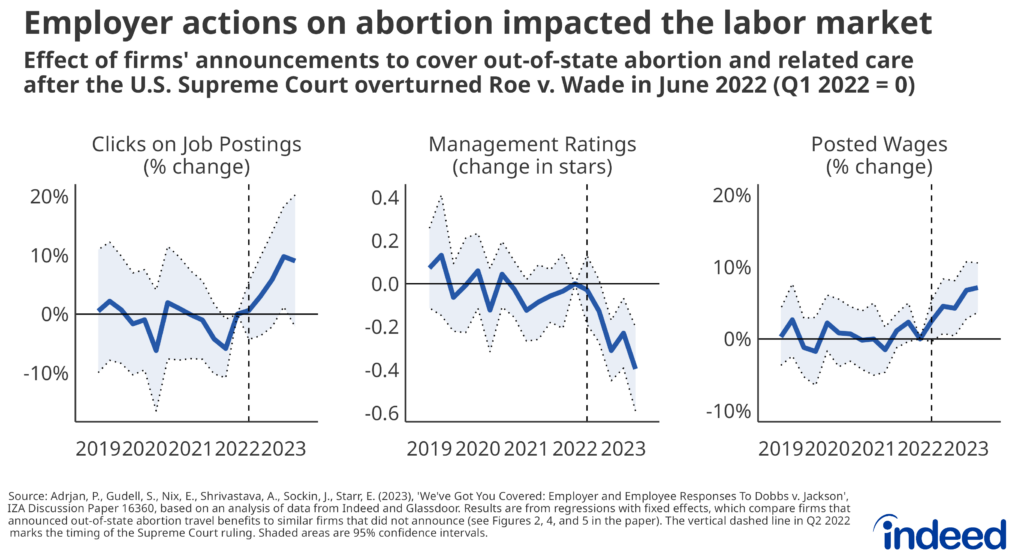Key points:
- Hundreds of employers announced support for reproductive healthcare, including covering out-of-state employee travel for abortions, following the June 2022 Dobbs v. Jackson Supreme Court ruling overturning the federal right to abortion established in Roe v. Wade.
- Employers that announced these policies saw an 8% increase in clicks on their job postings compared with similar jobs at similar employers who did not announce a policy.
- Higher job seeker interest was concentrated in Democratic-leaning states and in typically female-dominated jobs in states where abortion became illegal after Dobbs.
- Satisfaction dropped amongst existing employees at the announcing firms, with online ratings of senior management falling 8%, driven by workers in typically male-dominated jobs.
- Announcing firms raised posted wages in job postings by 4% relative to non-announcing firms. The effect was strongest at firms where existing employee job satisfaction fell most.
After the U.S. Supreme Court’s decision in Dobbs v. Jackson overturned a longstanding federal right to abortion, hundreds of employers quickly publicly announced measures designed to ensure access to reproductive care for their female employees, including abortions. But while this public support seemingly helped with recruiting new employees, it also appears to have hurt existing employees’ job satisfaction—illustrating both the potential perks and pitfalls for companies that choose to wade into contentious political waters.
Post-Dobbs, firms that announced supportive reproductive care policies saw an 8% increase in clicks on their job postings compared to similar jobs at similar employers that made no announcement. Because trends were similar for both groups of employers prior to the Dobbs decision, but diverged immediately afterwards, findings are attributable to these public announcements of support themselves. Higher job seeker interest was concentrated in Democratic-leaning states and in typically female-dominated jobs in states where abortion became illegal after Dobbs. These findings and more are part of a new research paper from Indeed Hiring Lab and researchers at the University of Southern California, University of Maryland, and IZA Institute of Labor Economics.
The paper, “We’ve Got You Covered: Employer and Employee Responses to Dobbs v. Jackson,” analyzed the causal impact of the June 2022 Dobbs decision that overturned Roe v. Wade and left decisions over abortion access to individual states. Using job seeker behavior and posted wage data from Indeed and employee sentiment data from Glassdoor, we examined which firms announced such policies, what determined their decisions to announce, and how job seekers and current employees responded to those announcements.
Workforce Considerations Drove the Decision to Make a Public Announcement
The gender and political composition of announcing firms appears to have played a key role in those firms’ decisions to publicly announce supportive reproductive care policies. Firms were more likely to announce these benefits if their workforce consisted of more women or more Democratic-leaning workers. And firms with any employees located in so-called trigger states—states in which abortion became illegal as soon as the Dobbs decision was announced—were more likely to announce reproductive health benefits than those firms with none, but only to a point. The higher a given company’s share of employees working in trigger states was, the less likely that company was to make a public announcement of new or enhanced reproductive health benefits. We interpret this as evidence that these announcements were less about a benefit that companies expected many employees to take up, and more about signaling company culture.

Post-Dobbs Announcements Helped to Recruit New Employees…
Of course, just because a company did not make a public statement of support and/or publicly announce new benefits does not necessarily mean that company was not willing to privately work with employees or did not otherwise plan to support potentially impacted workers. But this implies another potential motive for those companies that did choose to make a public announcement, beyond simple altruism. The data show that announcing firms reaped clear benefits in recruiting potential employees over peer firms that made no public announcements of support.
Clicks from job seekers on job postings from firms that eventually did publicly announce reproductive support for employees and those that did not were similar prior to Dobbs. But post-Dobbs, clicks on postings from announcing firms increased by 8% compared to similar firms that did not announce, roughly equivalent to what we’d expect to see if those firms instead announced a 12% increase in wages compared to their peers. Larger increases were observed in clicks on typically female-dominated jobs in states where abortion became illegal or severely restricted, and for jobs located in Democratic-leaning states. Postings from smaller firms that made public announcements, those with presumably less-established brands that likely wanted to send a stronger signal about their culture, also received more attention than their peers.
…But Hurt Job Satisfaction Among Existing Employees
But while the recruiting benefits of having made a public statement of support are clear, there were equally clear impacts on satisfaction among existing employees. An analysis of company ratings from Glassdoor found that post-Dobbs, ratings for senior management fell 8% for announcing firms compared with non-announcing firms. The deterioration was largely driven by workers in typically male-dominated jobs, in both left- and right-leaning states, suggesting some element of gender politics could be at play.
There are a number of possible reasons for the deterioration in sentiment amongst men, including cultural beliefs, political views, or preferences for businesses not to take a political stance. And compared to their female peers, male employees were and are far less likely to directly utilize any newly available reproductive health benefits (though their partners might)—and on paper, those benefits are potentially quite valuable. Across the companies identified as having made public announcements of new or enhanced benefit policies, the average monetary value of those benefits was $4,500, according to our analysis. But in practice, the full potential value of those benefits is likely to be realized only infrequently and only by certain employees.
A broad-based raise, on the other hand, benefits all employees—even (perhaps especially) dissatisfied workers and/or those not able or willing to take advantage of female-focused reproductive health benefits. So, did firms “compensate” those workers in other ways? Using wage data from Indeed job postings, we found that pay at firms that did make post-Dobbs announcements increased 4% relative to similar jobs at non-announcing firms, even on top of the potential costs of offering additional healthcare benefits. This wage increase is separate from, and cannot explain, the increased job seeker interest in postings from announcing firms.
We also found that the increase in posted wages among announcing firms was larger at firms that experienced deeper declines in senior management ratings. This suggests, although it does not prove, that at least some companies that made post-Dobbs announcements and received negative feedback from existing employees may have offered bigger raises to offset deteriorating satisfaction with the firm’s political stance.
Conclusion
Politics and gender in the workplace clearly matter, and their intersections impact hiring new employees, retaining current ones, and setting company culture. Our research suggests that when workers learn about firm culture from outside the firm—for example, from social media or a press release—it can profoundly influence their job search. Current workers also respond to public statements of firm culture.
To put it simply, workers pay attention to companies’ stances on social issues and react accordingly. When firms decide whether and how to engage in dialogue on such issues (where not publicly engaging is also a statement), they need to recognize the likelihood of there being a tradeoff between attracting new employees and potentially alienating or losing current ones.
What does all this mean for the role of employers in providing healthcare benefits? Prior research suggests that access to contraception and abortion facilitates career advancement for women. Since many states made abortion far less accessible (if not outright illegal) after Dobbs, it is natural to wonder whether company policies related to reproductive travel care benefits could feasibly substitute for a sudden lack of local abortion care. Our findings suggest this is highly unlikely. While women in states where abortion is illegal are more interested in firms that announced such reproductive care, firms are generally less interested in offering such care in those states—perhaps in anticipation of backlash. If anything, this shows that a firm’s policy is no substitute for public policy.
Methodology
We developed a database of firms that publicly announced they would cover expenses incurred for travel to obtain an abortion and/or related care for employees in areas where this care was no longer available or severely curtailed post-Dobbs. We merged this information with data on job satisfaction, job search, and wages from Glassdoor and Indeed. The resulting analysis is based on 3 billion job seeker clicks, 2.5 million postings with wage information, and 6.5 million company reviews.
To examine the causal impact of these announcements, we compared the outcomes for the announcing employers with the outcomes for a counterfactual set of employers, who are similar in many ways except that they did not announce a post-Dobbs policy. For each announcing firm, we checked which other, non-announcing firm job seekers most commonly clicked on during the same search session. This novel approach helped identify which non-announcing firms were most similar to the announcing firms from the perspective of the job seekers themselves.
The results of an 8% increase in clicks, 8% decline in management ratings and 4% increase in posted wages are regression-based, difference-in-differences estimates of post-Dobbs changes at announcing firms relative to non-announcing firms. The regressions control for job title, state, firm, and quarter, ensuring a like-for-like comparison that considered the outcomes for jobs with similar characteristics.



